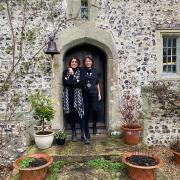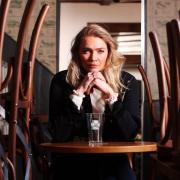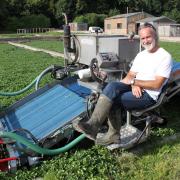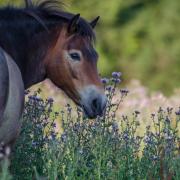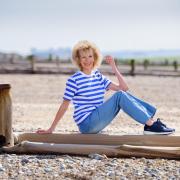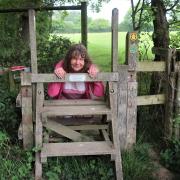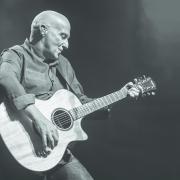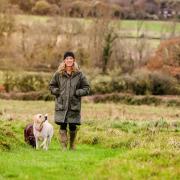Ray Mears, Britain’s favourite bushcraft expert, has confronted crocodiles and grizzly bears, and even tracked fugitive gunman Raoul Moat, but nothing prepared him for the loss of his first wife to cancer. As he reflects on his extraordinary life, he talks about finding love again – and why he treasures his home in the Sussex countryside
Ray Mears isn’t one for navel gazing. “Talking about myself just isn’t something that comes naturally,” he admits on page one of his newly published autobiography. But talk about himself he does, for the next 333 pages, although he admits he found the process difficult.
There’s all the stuff you might expect in this book, from his early beginnings in bushcraft and derring-do adventures filming in the wild to absorbing advice on how to choose the best knife, axe and saw for the great outdoors. There’s also a lot of stuff you really don’t expect from this most private of men, including a moving account of his first wife’s unsuccessful battle with cancer and his struggle to come to terms with her loss.
Naturally enough, Ray, 49, is much happier talking about animal tracking or his dangerous encounters with wild beasts, and tenses when the conversation turns to personal matters. Which begs the question, why on earth did he agree to write the book? Why put himself through the wringer? Why do something so obviously distasteful to him?
When we chat a few weeks before the book launch, however, he says the time felt right. “I was always sceptical about whether I should write my memoirs, but I’ll be 50 next year and it’s 30 years since I started Woodlore [his bushcraft school at Etchingham in East Sussex], so I slowly came round to the idea that it was time to tell my story,” he says.
And what a story he has to tell. Unable to join the Royal Marines because of poor eyesight, Ray took a job in the City, before quitting to found Woodlore. He was drawn to Sussex by its dense woodland. “I can’t live without trees and East Sussex is the most wooded part of England. It’s an amazing county with a massive variety of wild plant species, the majority of which are found here because we have this great range of habitats – from freshwater wetlands and salt marshes to shingle shores.”
But he declines to reveal his favourite Sussex haunts. “I never answer that question because everyone would go there. Besides, we should all find our own beautiful spots. You could spend a lifetime just exploring the country lanes around Sussex.”
Fate, he suspects, chose him for the outdoor life, though sleeping under the stars wasn’t exactly mapped out for him as a child growing up in the suburban streets of Kenley in Surrey. His parents were supportive of their only child’s desire to hang out in the woods, but he was never far from roads or people.
The pivotal moment came when he was given a book about animal tracking for his eighth birthday, and he wasted no time in putting his new-found wisdom into practice. “I’ve never forgotten that feeling of being out overnight for the first time on my own with no one to support me and nothing but the knowledge I carried.”
Ray must have cut a singular figure among his peers. Instead of rushing out to buy the latest rock album, he’d spend hours making bows and arrows, flints and arrowheads. He describes himself as a bit of a loner at this period and acknowledges it was perhaps “inevitable” that he wouldn’t fit in with his schoolmates, preferring to hike for miles across the North Downs or go into the woods in the worst conditions imaginable to hone his fire-making skills.
His obsessions paid off, however, and he built a hugely successful career off the back of his bestselling survival books and television series, though he doesn’t consider himself a TV personality and rejects the survival expert tag. “I don’t want to be stereotyped with this word ‘survivor’. I can’t stand it. It’s a small part of what I do. I’m a simple woodsman.”
But his life hasn’t always been a bed of roses. He met his future wife, Rachel, a scuba diver, when she enrolled on one of his survival courses, and knew she was the one. After a tentative courtship, they settled in Eastbourne with her two young children, Nathan and Ellie, before moving to a beautiful wooded area on the Sussex/Kent border, where they built their perfect home.
Life was good until one fateful day in 2003 when Ray returned from a business trip to discover Rachel had breast cancer. “The world stopped turning on its axis and everything was different in an instant,” he says.
The cancer proved terminal and for the next two years he watched, helplessly, as the illness took hold. “Her decline was as painful as it was rapid, though she wanted life to continue as normal so she hid the fact that she was in a lot of pain. I remember her taking Nathan to the airport and she held it all in until she got home, where she collapsed and I ended up taking her to hospital.”
They had always ribbed each other mercilessly about getting married, but ultimately never felt the need, knowing they were totally committed to each other. But suddenly it became the most important thing in the world and they were married at Eastbourne Register Office in 2006. Not long after, Rachel’s health began to unravel and she died at home.
Losing her was almost unbearable. “I’d spent two years caring for her and all of a sudden there was a void, and I was on my own,” says Ray. “I fell apart – physically as well as mentally – and the immense strain and grief also tore the family apart.”
He felt consumed with anger, but refused to take it into the forest, his normal refuge, because he felt it would be “like contaminating something beautiful”. So after crying solidly for three days, he hit the gym, which gave him a routine and mental distraction.
And so began a new chapter. “I had to close the door on the life I’d had, accept it was over and start something new. I wouldn’t make comparisons – what was before was before.”
He didn’t think he’d ever meet another woman, but life surprised him when Ruth, his future wife, swept him off his feet while he was on a lecture tour. Turning up at a book signing with friends, she asked, straight out, if he was married. It floored him for a second, then he blurted out, “Actually, my wife passed away,” before inwardly chiding himself for putting her off because he found her very attractive. Unfazed, she looked him in the eye and said: “I’m sorry, that’s a shame. Do you want another one?” before discreetly leaving her email address with one of the security girls. Eighteen months later, they were married at Wadhurst Castle and now live contentedly in Sussex with her teenage son Khristian and Labrador dog Jag. “I never dreamt I could be this happy again,” he says.
But don’t be fooled into thinking Ray has settled into a life of quiet domesticity. After confronting two of Australia’s most deadly crocodiles for his recent ITV series Ray Mears’ Close Encounters, he’s currently filming a series about the American Wild West for the BBC. “America is a very big place and the lives of the people who went west were quite exhausting,” he laughs. “Hollywood hasn’t told the truth at all.”
But perhaps nothing will compare with the adrenaline rush he experienced while hunting down the fugitive gunman Raoul Moat in the summer of 2010 – something he reveals for the first time in his memoirs.
When Moat, who had shot his ex-girlfriend, murdered her boyfriend and shot a police officer at close range, took off into dense woodland in Northumberland, Ray contacted the police to offer his tracking services. He was met with some scepticism, not least when he informed a stony-faced crack police search team that he would need to track from the front, despite there being an armed gunman on the loose.
Quickly proving his worth, however, he spotted signs within minutes that Moat had recently been in the woods and believes they came within 20 yards of him near a deserted boathouse, which may have precipitated his decision to break cover. Indeed, Ray was later told by specialist firearms officers that Moat had told them during negotiations on the riverbank that he’d been visited by a police dog in hiding, which had left without barking.
“If it’s true, the only time it could have been was when we were tracking him earlier that afternoon, because it’s the only time the police dogs were let off the lead,” says Ray. “He must have known the game was up and I take immense satisfaction from that.”
But Ray isn’t ready to hang up his walking boots just yet. “There’s so much more to learn and do, so many tracks to be discovered. I just hope Father Time is kind to me because I have a long road still to travel.”
My favourite Sussex
Restaurant: Ashdown Forest with a picnic has to be the best restaurant in Sussex.
Shop: Trevor Mottram, the wonderful cookware specialist on the Pantiles in Tunbridge Wells.
View: From Bo Peep hill near Alciston, looking north across the Weald, which is particularly lovely when you can see rare orchids and woodland in the distance.
Place to visit: Chanctonbury Ring. It’s amazing to think Charles Goring planted trees there in 1760 and lived to see them grow into maturity.




